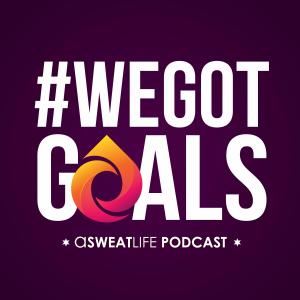#WeGotGoals by aSweatLife

A deep dive into mental health, part 3: Ariana Alejandra Gibson on Her Life's Mission to End Mental Health Stigma
[Content warning: on this week’s episode, we’re going to talk about mental illness and there will be brief mentions of other potentially triggering things like sexual violence and the end of life. If you’re not ready to listen to that, skip ahead to the next one.]
It’s 2022, and therapy is trending. We’re living in a time when people are putting things like, “therapy is sexy on sweatshirts.” And still, Forbes reported in February of 2021 that 47% of Americans believe that seeking therapy is a sign of weakness.
How can that possibly be?
If you’ve ever been the first person you know to deal with something, you get it. It’s hard to talk about something before you have the language to do it. And add the fear of sharing the thing you’re going through and being met with silence. That’s what living in stigma feels like, but what does being stigmatized do to you?
According to Psychiatry.org, stigma is the idea that a person with a mental illness is dangerous, incompetent, to blame for their mental illness. And if you’re living with a stigmatized mental illness or disorder, stigma holds you back.
You’re less likely to seek help or treatment and less likely to stay with treatment, you’re more likely to socially isolate; you experience a lack of understanding by family, friends, coworkers, or others; have fewer opportunities for work, school or social activities or trouble finding housing; you’re more likely to experience bullying, physical violence or harassment; Health insurance probably doesn't adequately cover your mental illness treatment; and you live with the belief that you'll never succeed at certain challenges or that you can't improve your situation.
Stigma is hopelessness - it trains us to believe that we are all alone and the only person who has gone through the thing we’re going through. When I hear stigma described - it sounds an awful lot like the dementors in Harry Potter, which brought those feelings of hopelessness.
When we posted the #Sweatworking Summit pitch competition, which was focused on making mental health more accessible, the tags and mentions of Ariana Alejandra Gibson CEO and founder of The Stigma App came rolling in.
So much so, that she and I decided we should get on the phone and figure out what we have in common. I learned pretty quickly that Ariana's default is vulnerability. But it hasn't always been.
Her journey mirrors a lot of ours.
Ariana is a documentary filmmaker and mental health activist who spent her early career as a creative director and brand strategist for companies ranging from tech startups to Fortune 500s. She is the Founder and CEO of STIGMA App, a new mental health app that uses storytelling to fight loneliness and improve mental health.
She is also one of the 46 percent of Americans who will personally experience mental illness in their lifetimes and believes the only way to normalize conversations about mental health is to be brave enough to have them. So, Ariana shares very openly about where the platform came from - her father’s schizophrenia, her husband’s childhood trauma, and the death of one of her best friends. And that means that every time she talks about the platform, she has to open up about all of that. She gets to model living a life outside of stigma every single day.
I can't wait for you to hear my interview with Ariana.
Resources:
- Learn more about Stigma
- Follow Stigma on Instagram
- Follow Stigma on TikTok
- The Danger of a Single Story (The TED Talk Ariana referenced)






 Visit Podcast Website
Visit Podcast Website RSS Podcast Feed
RSS Podcast Feed Subscribe
Subscribe
 Add to MyCast
Add to MyCast